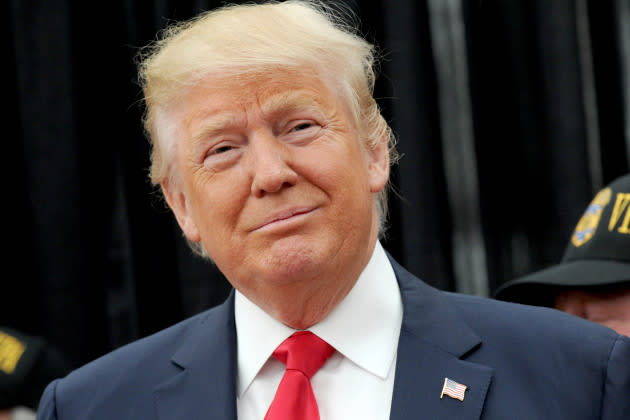Donald Trump Signs Covid-19 Relief And Government Funding Bill
- Oops!Something went wrong.Please try again later.

President Donald Trump signed a massive $2.3 trillion Covid-19 relief and government funding bill, ending several days of Christmas season drama as he balked at the legislation.
The White House said that Trump signed the bill on Sunday evening at Mar-a-Lago, after he complained over some of its spending provisions and that direct Covid-19 payments were only $600 per person.
More from Deadline
House Passes Bill To Increase Covid-19 Relief Checks To $2,000
Chinese Citizen Journalist Zhang Zhan Given Four-Year Prison Sentence For Coronavirus Reporting
Trump’s decision to sign the bill averts a government shutdown, with funding set to expire on Monday night. But unemployment benefits for millions lapsed on Saturday night.
In a statement, Trump said that he would “send back a redlined version [of the bill], item by item, accompanied by the formal rescission request to Congress insisting that the funds be removed from the bill.” But presidents do not have a line-item veto power — bills that land on their desks have to be signed or rejected in full — so his request is largely symbolic given that he has only 23 days left in his term.
The House on Monday will vote on Trump’s proposal to increase payments to $2,000 per person, and the Senate “will start the process” for a vote on the increased relief checks.
The massive bill contained a number of provisions of special interest to the entertainment industry, including a $15 billion fund to assist movie and legit theaters and live entertainment venues especially hard hit by the pandemic. The enhanced unemployment benefits also will be extended by $300 extra per week, and the Paycheck Protection Program will be renewed. Another provision would increase penalties for operating a pirated streaming service, among a host of new laws included in the legislation.
In his statement on Sunday, Trump said, “I am signing this bill to restore unemployment benefits, stop evictions, provide rental assistance, add money for PPP, return our airline workers back to work, add substantially more money for vaccine distribution, and much more.”
Trump’s decision to hold off on signing the bill generated a weekend of anxieties, given the implications of a government shutdown and a lack of stimulus to propel the pandemic economy.
After the House and Senate passed the legislation overwhelmingly last week, Trump released a video statement in which he attacked the bill, calling its $600-per-person direct payments insufficient, and ridiculing some of the spending provisions. He never explicitly said that he would veto the legislation, an act that would have jeopardized a badly needed extension of unemployment benefits and a host of other provisions as part of a $900 billion outlay for Covid-19 relief.
Trump’s attacks on the bill came as a surprise, as Treasury Secretary Steven Mnuchin was involved in the negotiations for the legislation. The president also attacked some of the government spending — like $40 million for the Kennedy Center — that the administration had previously supported and requested.
House Speaker Nancy Pelosi said in a statement, “Now, the President must immediately call on Congressional Republicans to end their obstruction and to join him and Democrats in support of our stand-alone legislation to increase direct payment checks to $2,000, which will be brought to the Floor tomorrow. Every Republican vote against this bill is a vote to deny the financial hardship that families face and to deny the American people the relief they need.”
Senate Majority Leader Mitch McConnell issued a statement which did not bring up Trump’s delay in signing the legislation. McConnell said, “I applaud President Trump’s decision to get hundreds of billions of dollars of crucial COVID-19 relief out the door and into the hands of American families as quickly as possible.” He did not say when and if the Senate would take up the $2,000 payments.
In his statement, Trump also said that the Senate would look into two issues that have been a constant source of his complaint: Section 230, the liability shield that protects tech platforms from the way that they moderate content; and election fraud, which he has raised repeatedly in the aftermath of his loss in this year’s election. So far, though, dozens of judges have rejected his campaign’s claims that the election was rigged, citing lack of evidence.
Best of Deadline
Coronavirus: Movies That Have Halted Or Delayed Production Amid Outbreak
Hong Kong Filmart Postponed Due To Coronavirus Fears; Event Moves Two Weeks Before Toronto
Sign up for Deadline's Newsletter. For the latest news, follow us on Facebook, Twitter, and Instagram.

